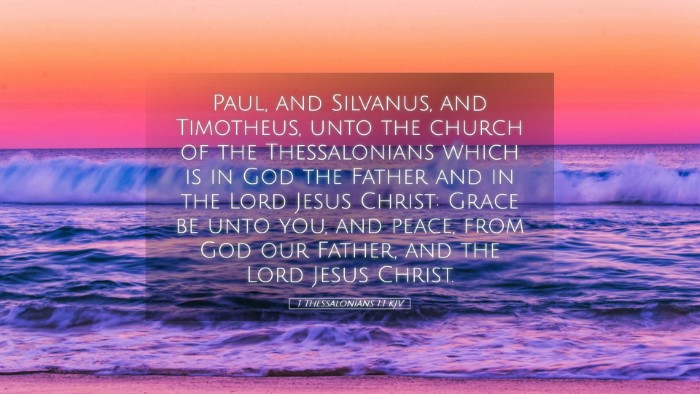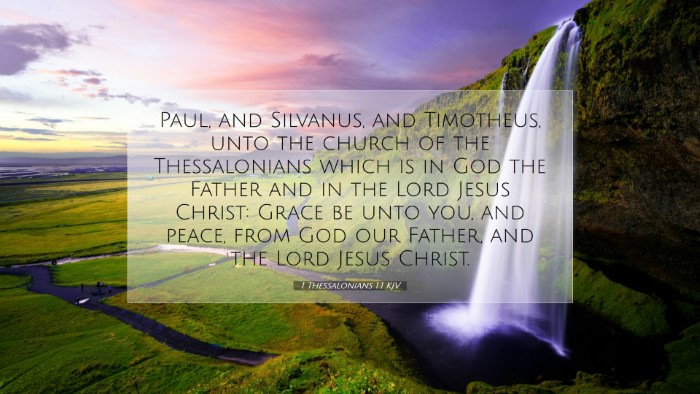Old Testament
Genesis Exodus Leviticus Numbers Deuteronomy Joshua Judges Ruth 1 Samuel 2 Samuel 1 Kings 2 Kings 1 Chronicles 2 Chronicles Ezra Nehemiah Esther Job Psalms Proverbs Ecclesiastes Song of Solomon Isaiah Jeremiah Lamentations Ezekiel Daniel Hosea Joel Amos Obadiah Jonah Micah Nahum Habakkuk Zephaniah Haggai Zechariah Malachi1 Thessalonians 1:1
1 Thessalonians 1:1 KJV
Paul, and Silvanus, and Timotheus, unto the church of the Thessalonians which is in God the Father and in the Lord Jesus Christ: Grace be unto you, and peace, from God our Father, and the Lord Jesus Christ.
1 Thessalonians 1:1 Bible Commentary
Commentary on 1 Thessalonians 1:1
1 Thessalonians 1:1 reads: "Paul, and Silvanus, and Timotheus, unto the church of the Thessalonians which is in God the Father and in the Lord Jesus Christ: Grace be unto you, and peace, from God our Father, and the Lord Jesus Christ."
Introduction
This opening verse of Paul's letter to the Thessalonians serves as a rich textual foundation for understanding early Christian community dynamics and theological principles. In this commentary, insights from Matthew Henry, Albert Barnes, and Adam Clarke are synthesized to provide a deeper look into Paul’s greeting, the significance of the individuals mentioned, and the context of the church in Thessalonica.
Context of the Passage
The Apostle Paul, along with his companions Silvanus (or Silas) and Timothy, established the church in Thessalonica during his second missionary journey (Acts 17:1-9). The city was a significant commercial hub in Macedonia, and the church faced persecution and challenges, prompting Paul's writings to instruct and encourage them.
Authorship
Matthew Henry emphasizes the importance of Paul’s association with Silvanus and Timothy, noting that the inclusion of co-laborers signifies a united front in the ministry, enhancing the authority and authenticity of the message. Albert Barnes adds that the collaborative nature of this greeting indicates mutual endorsement and shared experiences in the work of the gospel.
Greeting to the Church
This epistolary greeting is notable for its theological depth and ecclesiastical implications. Paul addresses the recipients as "the church of the Thessalonians," which Clarke illuminates as indicative of an assembly or body of believers united in their faith in God and Christ. The phrase reflects their identity and purpose, rooted in divine origins.
Theological Insights
In God the Father and in the Lord Jesus Christ
The dual reference to God the Father and the Lord Jesus Christ encapsulates the Christian understanding of the Trinity. Henry points out that this highlights the relationship believers have with both the Father and the Son, establishing the foundation of their faith. Each member of the Trinity plays a crucial role in the believer's spiritual life.
Grace and Peace
Paul's blessing of "Grace be unto you, and peace" is a profound theological declaration. Barnes states that grace embodies God's unmerited favor, essential for salvation and sanctification. This is complemented by peace, which signifies both inner tranquility and harmony within the Christian community. Clarke notes that the pairing establishes both the individual and communal aspects of Christian experience.
Implications for the Church Community
This verse serves as a model for pastoral greetings. The acknowledgment of their identity in God provides reassurance and reminds the church of their spiritual heritage. Leaders and scholars should take note of the relational aspects emphasized in Paul’s greetings, fostering unity and encouraging believers in their shared faith.
Historical Context
The church in Thessalonica emerged amidst cultural diversity and significant challenges. Understanding this context as highlighted by Henry reveals the necessity of a strong theological foundation for facing persecution and promoting resilience among believers. Paul’s words are not just a formality; they are imbued with the intent to strengthen faith amidst trials.
Conclusion
1 Thessalonians 1:1 encapsulates vital theological truths and practical implications for the church. This passage serves as a reminder to pastors, students, and theologians of the enduring significance of grace and community in Christ. The insights from Henry, Barnes, and Clarke enrich the understanding of this greeting, encouraging all to explore the depths of their faith in relationship with God.


